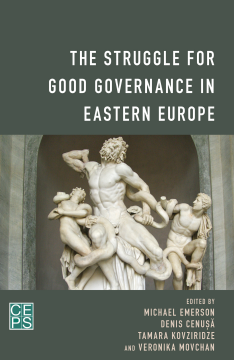
BOOK
The Struggle for Good Governance in Eastern Europe
Michael Emerson | Denis Cenusa | Tamara Kovziridze | Veronika Movchan
(2018)
Additional Information
Book Details
Abstract
At a time when many regions of the world, including Europe, see a resurgence of authoritarianism, three countries of Eastern Europe – Ukraine, Georgia and Moldova – are struggling to counter this trend with the aim of developing European-style democracies in the framework of their Association Agreements with the European Union.
This book offers an in-depth analysis of this challenge, with expert contributions on the workings of these countries’ democratic and judicial institutions, their anti-corruption policies and the hazards they must overcome, including the strong presence of oligarchs. Other themes include how these countries are adapting to their precarious geo-political positioning between the EU and Russia and how the quality of their political and economic governance compares with the Balkan states.
The book complements three landmark Handbooks (now in their 2nd edition and also published by Rowman & Littlefield International) explaining the progress achieved in implementing the comprehensive Association Agreements that each of these countries has entered into with the EU.
The struggle to advance good democratic governance in these close neighbours of the EU represents a test case of the highest strategic significance for both the EU and the three states themselves. For the most part, the jury is still out over its outcome.
Michael Emerson is a Senior Fellow at CEPS in Brussels, and was formerly with the European Commission, including as EU Ambassador in Moscow.
Denis Cenușă is Programme Director at the independent Moldovan think tank, Expert-Grup.
Tamara Kovziridze is Senior Director of the Reformatics consulting company in Tbilisi, and former deputy minister in the Government of Georgia.
Veronika Movchan is Academic Director of the Institute for Economic Research and Policy Consulting in Kyiv.
Table of Contents
| Section Title | Page | Action | Price |
|---|---|---|---|
| The Struggle For Good Governance In Eastern Europe | Cover | ||
| CONTENTS | v | ||
| Preface | ix | ||
| The Essence of the Struggle | 1 | ||
| 1. Towards becoming European-style Democracies | 9 | ||
| Introduction | 9 | ||
| Where do the three countries stand? | 12 | ||
| How democracy evolved: Parallel trajectories | 13 | ||
| Ethnic, regional and cultural conflicts and divisions | 17 | ||
| General constitutional systems | 21 | ||
| Government performance and legitimacy | 26 | ||
| Political parties and party systems | 31 | ||
| Revolutionary and rule-based forms of political competition | 37 | ||
| Media, civil society, media, popular movements, social forces, religious groups | 41 | ||
| External policies and influences | 46 | ||
| Concluding remarks | 49 | ||
| References | 51 | ||
| 2. Oligarchs as Key Obstacles to Reform | 55 | ||
| Introduction | 55 | ||
| Who are the oligarchs? | 56 | ||
| Oligarchic portfolios | 59 | ||
| The disadvantages of oligarchy | 67 | ||
| How to respond to the challenges posed by oligarchs? | 80 | ||
| Conclusions | 83 | ||
| References | 84 | ||
| 3. Integrity and Judicial Reform on Trial | 87 | ||
| Introduction | 87 | ||
| Constitutional and institutional reform | 91 | ||
| Constitutional and institutional reform in Ukraine | 97 | ||
| Constitutional and institutional reform in Moldova | 104 | ||
| Fighting corruption in the justice sector | 109 | ||
| Judicial implementation of the DCFTA | 122 | ||
| Conclusions | 128 | ||
| References | 132 | ||
| 4. Anti-Corruption Policies | 135 | ||
| Introduction | 135 | ||
| Strategic and overarching aspects | 138 | ||
| Institutional issues | 143 | ||
| Specific legal mechanisms | 152 | ||
| Broader policy issues | 164 | ||
| Conclusions | 173 | ||
| References | 176 | ||
| 5. Can greater gender equality in senior roles help reduce corruption? | 177 | ||
| Introduction | 177 | ||
| Definition of \"corruption | 178 | ||
| Definition of \"women in power | 179 | ||
| Linkages between women and corruption | 181 | ||
| Proposed areas of further research and methodology | 191 | ||
| References | 199 | ||
| 6. Incomplete Hegemonies, Hybrid Neighbours: Identity games and policy tools | 203 | ||
| Introduction | 203 | ||
| Hybridity in the common neighbourhood | 207 | ||
| Hybrid hegemonies: The EU and Russia | 213 | ||
| Options and scenarios | 228 | ||
| References | 237 | ||
| 7. Political and Economic Governance in the Balkans vs Eastern Europe | 243 | ||
| Introduction | 243 | ||
| Political governance | 245 | ||
| Economic development and governance | 255 | ||
| Comprehensive comparisons and policy implications | 266 | ||
| References | 271 | ||
| Annex A - Methodologies | 273 | ||
| 8. Demystifying the Association Agreements | 277 | ||
| Step change: From the ENP to DCFTA | 279 | ||
| Why the AA-DCFTA? | 281 | ||
| Understanding the agreements | 284 | ||
| Challenges of implementation | 291 | ||
| References | 295 | ||
| About the Contributors | 299 |
